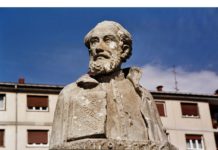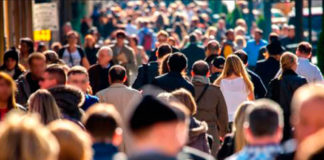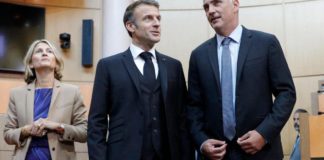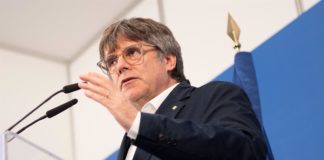Euskal Herria, as a nation, is sick. In recent years it has been suffering, in our opinion, a severe process of denationalization, with a strong loss of national consciousness. Basque nationalism, in general, has not correctly diagnosed the evil, and consequently the symptoms of the disease are increasingly evident: in this globalized world our collective identity is being lost and, what is worse, we are increasingly becoming Spanish or French.
The symptoms are visible, any Basque citizen can perceive them:
1.- The diglossic situation of Basque worsens: while knowledge of Basque continues to increase (mainly in the Basque Autonomous Community) its use in the street decreases. A lot of money is spent on teaching, on hiring experts, on sociological studies, etc., but the results are few: in Euskal Herria (the Basque nation), Spanish and French are becoming stronger on the street, at home and everywhere. It is only necessary to see how the use of Basque has declined in recent years in the foremost Basque-speaking towns of the country.
On the other hand — and this seems very worrying — social pressure in the street and linguistic militancy are now much weaker than they were 25 years ago. Conformism prevails, especially in the Basque Autonomous Community. Linguistic awareness is weak, compared to that of other stateless nations (Flanders, Catalonia, Québec….). And although in theory more and more young people are becoming Basque-speaking in our schools, the use of the language among young people also declines. Motivation is not worked at and our national language is viewed purely in the instrumental sense.
2.- Weakness of the Basque symbolic space: we can address several aspects. The Basque sports teams is one of them. The ESAIT (Basque sports umbrella organisation) organisation has disappeared; in recent years the demand for Basque national sports teams has weakened. Those matches in which the Basque national soccer team filled the San Mamés stadium in a vibrant patriotic atmosphere are long gone. Currently, many fewer people go to the matches of our football team, when they are held.
It is significant to observe in our foremost Basque towns which are the football teams followed by our children: many of our children do not wear the shirts of the Basque teams, as they did in the past while it is increasingly common to see shirts of Barcelona or Real Madrid…. Some even dare to wear the Spanish soccer team’s shirt, something that would have been unthinkable only 10 or 15 years ago.
The public display of our national flag, the ikurriña, has also declined. Previously it was abundantly exhibited in political, cultural or sports events. When our mountaineers crowned the highest peaks on the planet, they always erected an ikurriña there. Now they place the flag of the expedition’s sponsor….
3.- Spanish or French representations increase: once it was rare to see Spanish or French representations in our foremost Basque and Abertzale (nationalist) towns. Today, however, in many bars or restaurants it is common to watch the programming of Spanish and non-Basque TV channels. On a musical level, Spanish music can be heard today in many of the open-air bars, without anyone blushing for it.
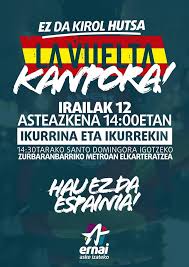
4.- The desire for independence drops: sociological surveys show that Basque independence feeling is declining in recent years. It doesn’t surprise us. If the Basque national conscience weakens, the desire for independence drops. There is a direct relationship between patriotic feeling and desire for independence: without the first, the second cannot take root. Basque denationalization is the best ally of Spanish and French imperialism.
5.- Disappearance of popular patriotic groups: pressure groups and popular patriotic movements have disappeared or show little activity. The movement in favour of the Basque language EUSKAL HERRIAN EUSKARAZ (Basque Language in the Basque Country), very active in the past, is practically inactive today. We have already mentioned the disappearance of the ESAIT organization, which was fighting to gain official status of the Basque sports teams. The same has happened with the popular movement BAI EUSKAL HERRIARI, which was fighting for Basque symbols. Even an organization of great potential, with the aim of articulating Basque territoriality beyond imposed borders (UDALBILTZA -organisation of Basque municipalities-), shows hardly any public activity today. In short, the groups that cultivated the national field (language, sports teams, symbolic elements or territoriality) are missing, inactive or in deep lethargy.
6.- Change in political discourse: an obvious change has taken place in the discourse of Basque nationalist parties in recent years. Seeking to attract the vote of the Spanish electorate, they have parked the issues of Basque national character, thinking that otherwise they would lose votes. The discourse in favor of the Basque language, culture and identity, which is the basis of Basque nationalism, has been very modulated, so as not to frighten the Spanish electorate and in order to capture their votes. We have even heard a nationalist politician say that he is pro-independence, but not patriotic (abertzale). This is what we call the “Rufián effect”, because it was the Catalan politician Gabriel Rufián who repeated the same absurd phrase several times. And some Basque nationalist politicians have copied that bad model.
That same sector of Basque independentism is now praising “multiculturalism”, while omitting in its speech the Basque language and culture.
7.- The new Basque singers: the process of denationalization also reaches the musical field. It is increasingly common for Basque musicians to sing in Spanish or English. There have always been singers or musical groups among us who sang in Spanish, of course, but they were Castilian-speaking musicians, not Basque-speakers. The novelty is that now Basque-speaking rock groups sing in Spanish or English. This is a very significant phenomenon, which demonstrates the weakness of the Basque national feeling in these artists. In this regard, we note also that the musical Basque-language radio stations follow the same trend, marginalizing Basque music and prioritising songs in English or Spanish.
8.- The Basque dance groups, briefly: “the Basques are a People who sing and dance on both sides of the Pyrenees,” said Voltaire. It is curious to see today in our foremost Basque towns how classes of “Sevillan” (Spanish folk music), “zumba”, etc. dance proliferate, while Basque dance groups have difficulty getting members. We did not invent anything, the great ethnographer Juan Antonio Urbeltz also expressed his concern about this phenomenon in a recent interview in the magazine ARGIA (in the article “Euskalduntasuna noraezean dago”, that is to say, “Basqueness has lost its way”)
We have mentioned only some of the symptoms of our denationalization process, as the entire list would be very long. They are the symptoms of the disease, which will only disappear if treated correctly. It is useless to want to improve symptoms without seeing or treating the underlying disease. To improve the situation of our language, to achieve the official status of the Basque sports teams or to banish the Spanish or French representations from our towns, we must treat the disease correctly. And before treating it, succeed with the diagnosis.
Our diagnosis is clear: a weak Basque national conscience underlies that denationalization process.
And the way to deal with the disease is logical: to strengthen the Basque national consciousness. Get to work on the uncomplexed Basque nationalism that will defend the Basque language, culture and identity, without inhibitions.
This is therefore the main work of NAZIOGINTZA. And to carry it out we need your help. Become a member, join us! https://www.naziogintza.eus/en/join-us/

![tiempo-roto[1]](https://www.naziogintza.eus/wp-content/uploads/2019/09/tiempo-roto1.jpg)


